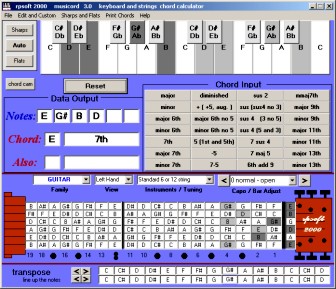| |
Forward
This page shows example usage of
rpsoft 2000 software "musicord" for chord chart applications. To
view the main page of this software and view its main characteristics,
view it here at: musicord.
Music Chord Charts
Chord charts would seem a great way to learn
keyboard and stringed instrument chords. However, particularly if
you are using a stringed instrument, such as guitar, banjo, ukulele or
the like, thousands of chord fingerings can be possible as you become
better and better at music skills. Using a normal chord chart it
may become hard to locate the exact chords you need. Musicord
allows you to either view the chords that you wish directly - or you can
print out a series of chords that work for you. A chord chart
based on what you want, and not the "average" of everyone.
Options exist for all of its stringed instrument variations and preset
tuning variations including guitar, bass, ukulele, banjo, and even
mandolin, cittern, tiple, bouzouki, violin family, lute family and more.
The capo system of Musicord that will show chord fingering down the
fretboard also works for left handed option, as well as custom tuning,
storing of custom instrument setups and also printing.
| |
 |
|
CHORD VIEWING
One can either view chords directly as shown on the
screen on software screen on the left, or one can choose to print
out exactly those chords that one needs for your own music chord
chart. You can print both right handed and left handed
chords, or chords fingered down the fretboard. The
combinations of possible chords with all of these variations and the
variations in chord types themselves make thousands of possible
guitar / stringed instrument fingerings. Arrange to display
just the ones that you want. |
|
| |
|
|
|
|
| |
The above shows the musicord screen for a
left hand guitar with normal tuning featuring an E dominant 7th chord
Note: Actual program screen is larger and more readable |
|
|
|
Chords Recognized / Created
28 chords in all,
including: major, minor, major 6th, minor 6th, 7th, major 7th,
minor 7th, mmaj7th, major 9th, minor 9th, major 11th, minor 11th, major
13th, minor 13th,diminished, augmented (also called + or +5), major 6
with no 5, minor 6th with no 5, 5, -5, 7-5, sus 2, sus (sus 4 no 3),
sus4 (3 no 5), sus 4 (5 and 3), 7 sus 4, 7 maj 5, 6th add 9.
Activating the Left Handed Display
Left handed display is easy to activate. It is just a "drop down
selection box" which is the second from the left over the stringed
instrument display. One simply selects "left hand" or "right
hand". That selection then is used for chord readout, and
fingering, for capo changes, as well as for printing. The other
selection boxes for stringed instruments allow you to pick the
instrument "family" such as guitar, bass, ukulele, banjo, or even violin
family, mandolin family or others. If you are into custom tunings,
another selection box allows you to select "preset" tunings for your
instrument or even some instrument variations - such as tenor guitars,
or 4 string banjos and the like.
Unique Tunings and
Storage of Favorite Tunings
If none of the above preset tunings will
work for you, Musicord also allows you to adjust each string to any
chromatic note you wish. And you can use this feature with 4
string, 5 string and 6 string musical instruments. If you are an
artist who often uses several different tunings, you can store your
custom tunings and they will be available to you as options under the
Musical Family "Custom".
Fingering Options
Dark gray areas show
the primary (lowest possible) fingering. Light gray areas show
duplicate fingering that could be substituted if the person wishes. For
example, one could substitute a light gray C note fingering for a dark
gray C note fingering. Substitutes may make the fingering easier,
or make for a better sound in the particular circumstance.
Options allow one to
see fingerings down the stringed instrument neck by using a “capo”
option.
Notes to Chords
One can also enter
notes on the piano keyboard or the guitar / stringed instrument fret board, and then see if
the software program recognizes the chord. If it does, the program
will show the chord name, (piano chord or stringed instrument chord) and any
alternates, in the data area.
What if one wants to
see stringed instrument fingering for a combination of notes that are not one of the
28 listed chords? Entering the notes on the piano keyboard or
stringed instrument fretboard (not the note nearest the neck though -
since that note is used for custom tuning) and Musicord will
show the note fingering on the fret board even if it is not one
of the 28 chords.
More Options
Even more options,
including printing, making custom tunings or instruments shown on the
main musicord page. To see these,
click here.
Relevant Links
(includes this page)
General:
Musicord Software- main page,
Left Hand Chord Example,
Retuned Strings Example
Musical Instrument
Families
Keyboard / Piano,
Guitar / Tiple,
Bass Guitar,
Ukulele,
Banjo, Mandolin / Bouzouki /
Cittern,
Violin / Fiddle / Viola / Cello,
Steel Guitar / Dobro,
Lute / Oud / Cumbus
Click Here for
eBook Info on One Person Band Recording
If you wish to Download and Try,
Click
here for the Download page. Note that you must also agree with our
rules and liability exclusion.
return
To rpsoft 2000 software
|
|